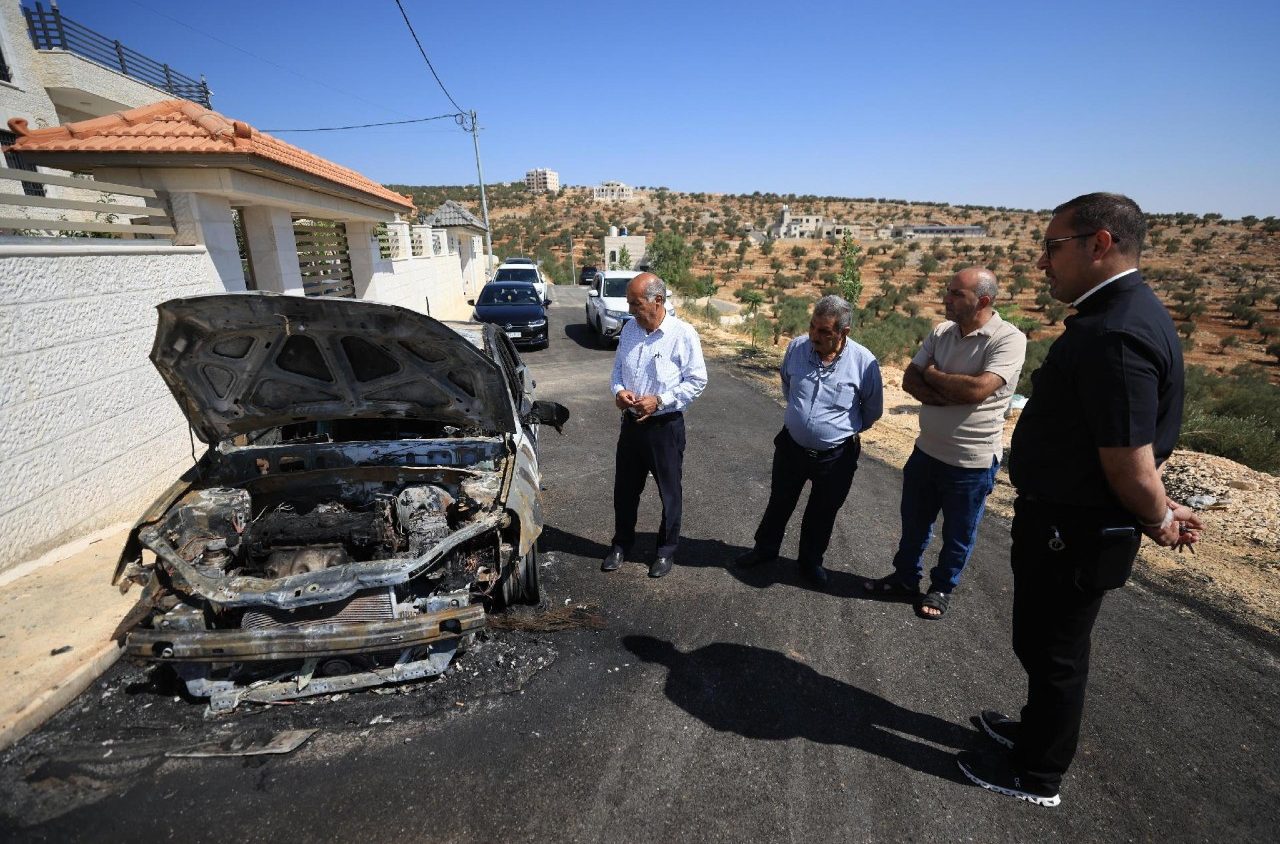By Beatrice Guarrera
Violence and attacks by Israeli settlers in Palestine continue without pause: buildings and cars destroyed, fires set, crops damaged. There is no peace in Taybeh. A small village a few kilometers north of Jerusalem and east of Ramallah, it is known as the last Palestinian village still entirely inhabited by Christians.
“In recent days, we have suffered new attacks by settlers,” Father Bashar Fawadleh tells Vatican News. He is originally from Aboud, another small village near Ramallah, and has served as parish priest of Taybeh’s Latin church since 2021. The town, with just over a thousand inhabitants, has three churches—the Orthodox Church, the Melkite Church, and the Latin-rite Church.
“The settlers destroyed one of the buildings belonging to the parish and to a parishioner,” as well as two cars parked in front of it. Fr. Fawadleh recounts how “they slashed the tires, smashed the glass, the windows—everything.”
For the second time in two days, the gas station was also destroyed and everything stolen. “These acts of vandalism and violence are unacceptable and require a firm condemnation by Israelis,” he says.
A few days ago, Israeli Prime Minister Benjamin Netanyahu expressed criticism of Monday’s attacks in a West Bank village carried out by some settlers, whom he described as a “handful of extremists.” Words that, Fr. Fawadleh says, “mean a lot” because they are further proof that “what is happening in the West Bank is truly a crime.” His response therefore seems to be a sign of international pressure stepping in to stop violence that “is unacceptable.”
Yet the village of Taybeh is not new to these dynamics, having long endured attacks by Israeli settlers, though they intensified after 7 October, 2023—especially at the start of the harvest season. In that area, many Palestinians must travel to reach their farmland when the time comes to gather the crops, but they are constantly hindered by roadblocks and violence.
Olive oil production, historically important in Palestine, is expected to drop sharply this year due to drought and settler attacks, according to the Palestinian NGO ARIJ. “This is the third year we have been unable to reach our olive groves,” the parish priest explains.
Frequent assaults have created a climate of fear among residents, now at the point of exasperation. “After the many settler attacks—not only in Taybeh but in the area east of Ramallah—many people are thinking of emigrating, of leaving the country because there is no security,” he continues. Daily life in Taybeh “is subject to restrictions due to many closures and military barriers.”
This current way of life marked by suffering attracted the attention of religious and civil institutions last July, when the leaders of the Christian Churches of the Holy Land—together with several diplomatic delegations—visited the village to express support with a simple request: peace.
According to Fr. Fawadleh, their message had three dimensions: a “sign of unity among Christians” and of closeness; a gesture of diplomatic solidarity; and an attempt to pressure authorities to stop the settler attacks, which had escalated to the point of starting a fire that reached the apse of the Church of Saint George.
In this time of tribulation, it is important “to keep praying,” the parish priest says, “because prayer can work miracles, it can change people, it can transform these situations” for the better and lead to peace.
He also stresses the need to support the community of Taybeh, a small parish sustained by the Latin Patriarchate of Jerusalem. The immediate goal is to create new jobs to give stability and income to many families, and to raise funds for a housing project.
The goal is to never lose sight of hope. “In place of fear of settler attacks,” the Church is called “to bring forth hope” in people’s hearts—hope that it will be possible to live in peace and security. “My hope,” concludes Father Fawadleh, “is the hope of the Resurrection.”
Thank you for reading our article. You can keep up-to-date by subscribing to our daily newsletter. Just click here
Pope’s Activities
Our Faith
Useful Information
Other sites
Our channels
